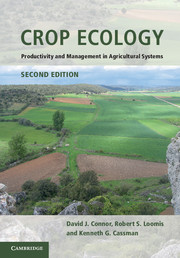Book contents
Part IV - Resource management
Published online by Cambridge University Press: 05 June 2012
Summary
Plant biology, soil science, and the impact of the environment on crop and soil interactions are central issues in crop ecology. Placing this knowledge into practical farming systems is the purpose of agronomy. In Part IV we give attention to how farm management integrates ecological principles with technology options in the design and management of cropping practices. Given the possibility to select a portion of the annual cycle for production, to choose appropriate cultivars and planting patterns, and to modify the environment by tillage, drainage, nutrient input, weed control, pesticides, correction of soil pH, and other means, the range of management options is extremely broad. While ecological factors determine what may be grown where, human decisions about labor supply, economics, and available technology are equally important in management.
Bridging the gap between environmental constraints and management to overcome them is considered for soil management (Chapter 12), how cropping may be adapted to supplies of water in rainfed systems (Chapter 13), and how water supply and productivity may be enhanced through irrigation in Chapter 14. Dependence of farming on energy and labor, the capacity of agriculture to provide motive energy as well as dietary energy (food), and whether energy supplies may be adequate in the future are presented in Chapter 15.
- Type
- Chapter
- Information
- Crop EcologyProductivity and Management in Agricultural Systems, pp. 321 - 322Publisher: Cambridge University PressPrint publication year: 2011



